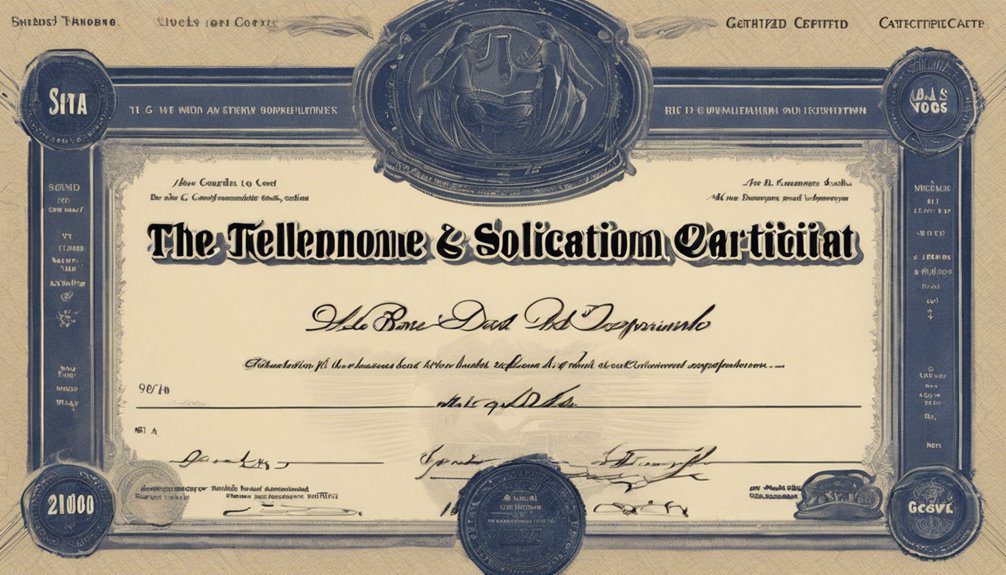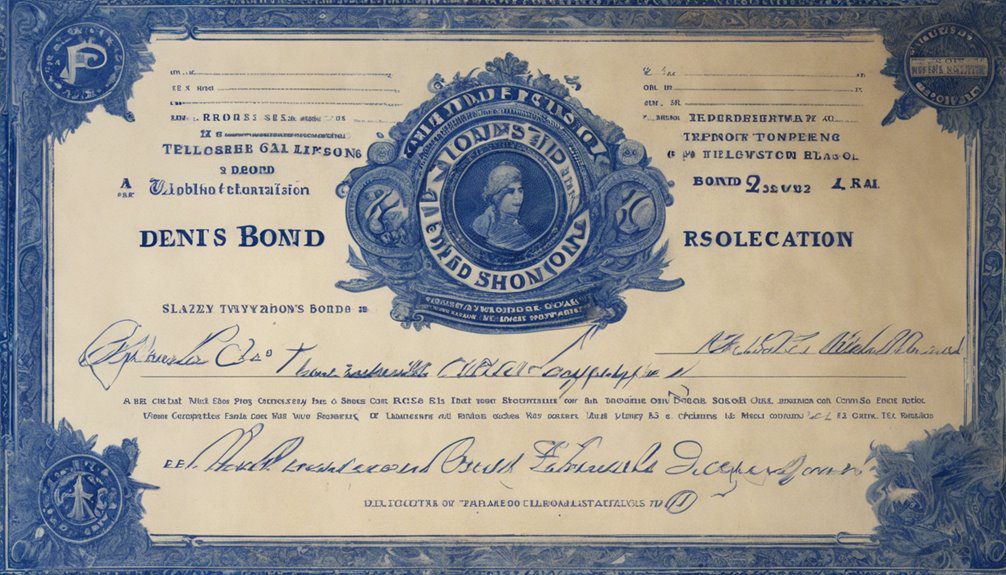If you're involved in telemarketing in Rhode Island, you need to understand the significance of a telephone solicitation bond. This bond isn't just a formality; it serves as a safeguard for both your business and the consumers you interact with. By securing this bond, you're not only adhering to state regulations but also enhancing your credibility in a competitive market. Curious about how you can navigate the requirements and avoid common pitfalls? There's more to explore that could impact your success in this industry.
What Is a Telephone Solicitation Bond?

Understanding the nature of a telephone solicitation bond is crucial for anyone looking to engage in telemarketing activities. A telephone solicitation bond acts as a financial guarantee that you'll comply with state regulations governing telemarketing. It protects consumers from potential fraud or misconduct by ensuring you adhere to the laws while conducting your business.
Typically, this bond is required by the state of Rhode Island before you can legally solicit customers over the phone. It demonstrates your commitment to ethical practices and consumer protection. If you fail to meet legal obligations or if a complaint arises, the bond can be used to cover damages incurred by consumers, thereby safeguarding their interests.
The amount required for the bond can vary based on several factors, including the type of business and its size. To obtain a bond, you'll likely need to go through an underwriting process that assesses your creditworthiness and business practices.
Once secured, this bond not only helps you comply with local laws but also enhances your credibility in a competitive market. As you navigate the telemarketing landscape, understanding this bond's role is essential to your success and reputation.
Importance of Telephone Solicitation Bonds
Telephone solicitation bonds play a vital role in the telemarketing industry, ensuring that businesses operate within legal boundaries. When you obtain this bond, you're not just complying with regulations; you're also building trust with your customers. It shows that you're committed to ethical practices and willing to protect consumers from potential fraud or misrepresentation.
Having a telephone solicitation bond in place helps you avoid legal pitfalls. If a customer feels wronged by your telemarketing practices, they can file a claim against your bond. This process provides a safety net, allowing you to rectify any issues while protecting your business's reputation.
Moreover, many potential clients and partners may require proof of a bond before engaging with you. It can be a deciding factor in whether they choose to work with your company.
Legal Requirements in Rhode Island

In Rhode Island, businesses engaged in telephone solicitation must adhere to specific legal requirements to operate legally and responsibly.
First, you need to register with the Rhode Island Secretary of State. This involves providing your business's name, address, and type of services offered.
Next, you'll need to obtain a telephone solicitation bond, which serves as a financial guarantee that you'll comply with state laws and regulations.
Additionally, you must maintain a "Do Not Call" list and respect the preferences of individuals who opt out of receiving calls.
You'll also need to provide clear and accurate information about your offerings during calls. If you fail to adhere to these requirements, you could face penalties, including fines or loss of your ability to solicit over the phone.
It's crucial to stay updated on any changes to regulations, as the legal landscape can shift.
By following these guidelines, you can help ensure your telephone solicitation practices are compliant and maintain your business's reputation in the community.
Understanding these legal requirements is essential for your success in Rhode Island's telephone solicitation market.
How to Apply for a Bond
Once you've registered your business and familiarized yourself with the legal requirements for telephone solicitation in Rhode Island, it's time to apply for your telephone solicitation bond.
Start by finding a surety company that offers bonds in your area. Research and compare different providers to ensure you're getting the best terms and service.
Next, gather the necessary documentation. You'll typically need to provide information about your business, including its legal structure, financial statements, and any relevant licenses.
Some surety companies may also require personal and business credit information, so be prepared for that.
Once you've chosen a surety company and collected your documents, fill out the bond application. This process may involve answering questions about your business practices and financial history.
Be honest and thorough, as this information helps the surety assess your risk. Additionally, ensure that you're aware of the bond requirements that may vary by state, as this can impact your application process.
After you've submitted your application and documentation, the surety will review your details and determine your eligibility.
If approved, you'll receive your bond, which you need to file with the appropriate state agency.
Make sure you keep a copy for your records, as it's essential for compliance.
Costs Associated With the Bond

Understanding the costs associated with a Rhode Island telephone solicitation bond is crucial for budgeting your business expenses. The primary cost you'll encounter is the premium, which typically ranges from 1% to 5% of the bond amount. This percentage varies based on factors like your credit score, business history, and financial stability.
For instance, if the required bond amount is $10,000, you might pay between $100 and $500 annually, depending on your qualifications. If you have excellent credit, you're likely to secure a lower premium, while those with poor credit may face higher rates.
Additionally, there may be fees associated with the bond application process, such as administrative or processing fees, which can vary by surety company. It's a good idea to compare quotes from different providers to find the best deal.
Don't forget to factor in the costs of maintaining compliance with Rhode Island regulations, as failing to do so could lead to penalties, further impacting your budget. Understanding bond approval processes can also help you navigate potential challenges related to credit issues and secure the best rates possible.
Duration and Renewal Process
The Rhode Island telephone solicitation bond typically has a duration of one year. This means you'll need to keep track of when your bond is set to expire to avoid any lapses in coverage.
As the renewal date approaches, it's essential to prepare for the renewal process to ensure that your bond remains active.
To renew your bond, you'll usually need to go through a simple process. Start by contacting your surety bond provider a few weeks before the expiration date. They'll guide you through the necessary steps, which may include submitting updated information about your business and paying the renewal premium.
Be aware that your premium could change based on factors like your business's financial health or claims history. Maintaining compliance with telemarketing regulations is crucial for ensuring the smooth renewal of your bond.
Once you've completed the renewal process and paid the premium, your bond will be extended for another year.
It's crucial to keep your bond current, as operating without it can lead to penalties or even the loss of your solicitation license.
Claims Against the Bond

When it comes to telephone solicitation bonds in Rhode Island, claims can arise if a solicitor fails to adhere to state regulations or causes harm to consumers. If you're a consumer and feel wronged by a telemarketer, you can file a claim against their bond. This bond acts as a financial safety net, ensuring you have a potential means of recourse.
To initiate a claim, gather all relevant documentation, such as call records, written complaints, or any evidence of misleading practices. Make sure to provide specifics about the incident, including dates and the nature of the violation.
You'll need to submit your claim to the surety company that issued the bond, as they're responsible for addressing valid claims.
If the claim is approved, the surety company will compensate you up to the bond's limit. However, keep in mind that this doesn't eliminate the solicitor's obligation to rectify the situation. They'll still be liable for any damages beyond the bond amount.
In the end, understanding how claims against the bond work can empower you as a consumer, ensuring that telemarketers remain accountable for their actions.
Differences From Other Business Licenses
Claims against telephone solicitation bonds highlight the specific regulatory requirements that set these bonds apart from other business licenses. Unlike general business licenses, which often cover a broad range of activities, telephone solicitation bonds are tailored specifically for telemarketers. This means you're not just applying for a license but also providing a financial guarantee that you'll adhere to state regulations regarding solicitation practices.
Another difference is the focus on consumer protection. With a telephone solicitation bond, you're essentially assuring the state and your clients that you'll operate ethically and comply with laws designed to prevent fraud and harassment. If you fail to meet these obligations, consumers can file claims against your bond, which may lead to financial penalties.
Moreover, the application process for these bonds typically involves a credit check and proof of business practices, unlike many other licenses that may only require basic documentation. This additional scrutiny emphasizes the importance of accountability in the telemarketing industry. Additionally, the financial stability of the telemarketer is evaluated to ensure they can fulfill their obligations, further protecting consumers.
Understanding these differences can help you navigate the requirements more effectively and ensure your business remains compliant in Rhode Island.
Common Mistakes to Avoid

Often, businesses new to telephone solicitation overlook crucial details that can lead to costly mistakes. One common error is failing to understand local and federal regulations governing telemarketing. Make sure you're familiar with the Telephone Consumer Protection Act (TCPA) and Rhode Island's specific laws. Ignoring these can result in hefty fines.
Another mistake isn't obtaining the necessary telephone solicitation bond. This bond protects consumers and your business, and neglecting it can lead to legal complications. Always ensure you have the proper documentation in place before starting your campaign.
Additionally, many businesses underestimate the importance of maintaining an updated do-not-call list. Ensure you regularly check and comply with this list to avoid contacting individuals who've opted out of solicitation calls.
Resources for Further Information
To navigate the complexities of telephone solicitation effectively, you should seek out reliable resources that provide comprehensive information on regulations, best practices, and bonding requirements.
Start with the Rhode Island Secretary of State's website, where you can find essential information on the laws governing telemarketing in the state, including licensing and bonding obligations.
Next, consider reviewing the Federal Trade Commission (FTC) guidelines. They offer valuable insights into national regulations that affect your telemarketing practices, such as the Do Not Call Registry and telemarketing rules.
Additionally, local business associations often provide resources, workshops, or seminars designed to help you understand the nuances of telephone solicitation.
You might also look into industry-specific publications and websites that focus on telemarketing and solicitation. These often include case studies and expert advice that can enhance your understanding.
Finally, connecting with a legal professional experienced in telemarketing laws can provide personalized guidance tailored to your situation.
Conclusion
In conclusion, obtaining a telephone solicitation bond in Rhode Island is essential for your telemarketing business. It not only ensures compliance with state regulations but also builds trust with your clients and the public. By understanding the legal requirements and the application process, you can avoid common pitfalls and protect your reputation. So, take the necessary steps to secure your bond, and you'll be well on your way to operating ethically and responsibly in the telemarketing industry.

